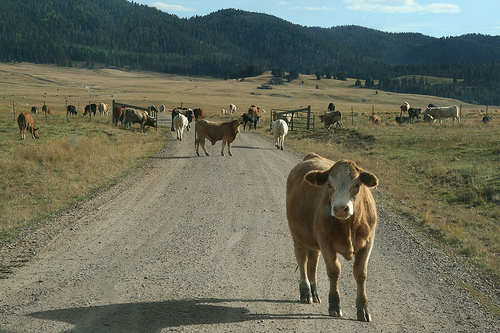Every so often, writers hit a road block. Sometimes we’re zipping along that writing highway and suddenly we take a detour and we’re off on a side road and boom! We run into a herd of cattle hanging out in the middle of our path. Sure, we could off-road it and drive through the pastures to avoid that stretch of road, but usually when we writers run into these blocks we do what anyone would do:
We hit the brakes.
The problem with hitting the brakes and stopping mid-journey is that it becomes that much more difficult to start up again. It’s like Newton’s second law of motion:
Objects in motion tend to stay in motion and objects at rest tend to stay at rest, unless a force is acted on those objects.
The same is true for writing. The longer a writer stays at rest and isn’t writing, the harder it is to get back on track. What do you do when you do hit a road block? What are your options when hitting the brakes becomes inevitable? Here are a few tricks I do when I need to get back in the swing of things.
1) Try a change of scenery.
Pack up your laptop or toss a notebook in your bag and head out the door. Go somewhere you don’t usually go to write. Don’t bring anything that might distract you. Turn off the cell phone and if there’s free WiFi at the cafe, don’t login. Pick up your pen or boot up your computer and just start writing. Don’t judge, just write.
2) Try setting a timer.
I like to add a little game of chance to this exercise: I roll a regular six-sided die and whatever number I get, I multiply it by ten and that’s how many minutes I have to sit with my writing. This means I could be on the hook for as little as 10 minutes or as long as an hour. Then for that stretch of time, all I have to do is sit with my writing.
Chances are, though, after I’ve sat for a minute or two, I start writing just to get over the boredom of sitting there. Once I start writing–whether I rolled a 1 or a 6–before I know it, I’ve written several pages and clocked-in at least an hour of writing.
3) Try some productive procrastination.
Productive procrastination is when you procrastinate on one task by doing another task that’s less pressing, but important nonetheless. Example: instead of writing the next chapter in your novel, procrastinate by doing an outline for the latter half of your book or writing a character sketch for a new character. The outline or character sketch are things you’d probably have to do anyway, so this way when you procrastinate you’re at least doing something productive.







